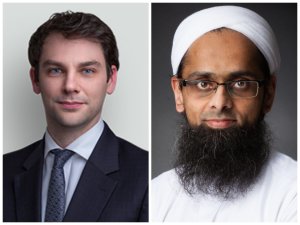We've defended reproductive rights from religiously motivated restrictions since our founding.
Religion should not stand in the way of reproductive healthcare.
A desire to restrict reproductive rights, and to control women's bodies, is a hallmark of religious fundamentalism. We strongly support the right of women to have legal and safe abortions and access to emergency contraception.
Since its founding the National Secular Society has supported reproductive rights. In 1878 our founder and vice-president were prosecuted for making information about birth control accessible to working class women.
Throughout the world, reproductive rights are still under threat from theocrats. While individual religious people hold diverse views on abortion, every stage of progress in reproductive healthcare has been fought by religious organisations. Often these have involved virulent campaigns of intimidation and misinformation.
84% of people in the UK believe abortion should be legal in all or most cases. This includes 76% of religious people and 94% of nonreligious people.
In the UK, emergency contraception can still sometimes be difficult to obtain. Some religious pharmacists have defied General Pharmaceutical Council guidance by refusing to sell it or even to dispense a prescription given to a woman after a consultation with her own doctor.
People of all religions and beliefs can have disagreements on the boundaries of bodily autonomy and reproductive rights. However, religious beliefs should not be used to restrict the bodily autonomy of other people.
Take action!
1. Share your story
Tell us why you support this campaign, and how you are personally affected by the issue. You can also let us know if you would like assistance with a particular issue.
2. Join the National Secular Society
Become a member of the National Secular Society today! Together, we can separate religion and state for greater freedom and fairness.
Latest updates
NSS welcomes calls for objective RSE in N. Ireland
Posted: Wed, 14 Jun 2023 14:12
The National Secular Society has said relationships and sex education (RSE) at faith schools needs reviewing across the UK, following a critical report on RSE in Northern Ireland.
The report, published this week by the Northern Ireland Human Rights Commission (NIHRC), highlighted that many post-primary schools in NI are failing to uphold children's rights because they teach stigmatising ideas about contraception, abortion and homosexuality.
The NSS said similar issues exist across the UK. In 2018, it published a report which found many faith schools explicitly teach that same-sex relationships, sex outside of marriage, contraceptives and abortion are morally wrong.
Homosexual acts "against the nature" of human relationships, says NI school
In its survey of post-primary schools in NI, the NIHRC found some schools present the Catholic teaching that "the use of any artificial means of preventing procreation is not acceptable". The NIHRC said teaching young people that contraception is wrong "contradicts risk-reduction approaches to youth sexual activity".
The research found most respondents do not mention "abortion" in their RSE policies. The majority of those that do reference "pro-life values" such as "right to life" and "precious life". Twelve per cent of respondents teach abortion according to the "biblical principles of the sanctity of life" and "the Christian ethos".
Although most schools condemn discrimination against LGBT people and claim to uphold inclusivity and diversity, schools "often contradicted these values in various ways", the NIHRC said. A third of schools explicitly teach heterosexual relationships are the "main" or "ideal" context for sexual intimacy, including one school which says it is "the most desirable option for a person's psychological development".
Some schools say homosexuality is wrong, including one which states "the belief that homosexual acts are against the nature and purpose of human relationships will be presented to pupils".
The report said most schools promoted abstinence, some specifically until marriage. Over 95% promoted the value of the "sanctity of marriage".
In NI, RSE must be taught "in harmony with the ethos of the school and reflect the moral and religious principles held by parents and school management authorities". The NIHRC found nearly 97% of schools made reference to their "ethos", "morals" or "values" in their RSE policies.
The United Nations Committee on the Elimination of All Forms of Discrimination Against Women (CEDAW) has made a recommendation to the UK government to "make age appropriate, comprehensive and scientifically accurate education on sexual and reproductive health and rights a compulsory component of curriculum for young people, covering prevention of early pregnancy and access to abortion, and monitor its implementation."
The NIHRC said the legal and policy framework for RSE is not sufficient to ensure RSE meets this requirement. It recommended the law be reformed to require schools to teach RSE which complies with CEDAW recommendations.
Last week, Northern Ireland Secretary Chris Heaton-Harris laid new regulations before parliament to make it compulsory for all post-primary schools in NI to teach pupils about access to abortion and preventing pregnancy.
The statement was criticised by the moderator of the Presbyterian Church in Ireland, Dr John Kirkpatrick, who accused Heaton-Harris of trying to "impose a particular worldview on the education of children in Northern Ireland".
NSS: Government 'must stop letting faith schools teach RSE through a faith lens'
In England, faith schools are permitted to "teach the distinctive faith perspective on relationships", and at all schools "the religious background of all pupils must be taken into account" when teaching RSE.
The NSS has criticised this guidance after its research found faith schools which call homosexuality "disordered", contraceptives "intrinsically evil" and abortion "the killing of an unborn child, an act of taking a human life".
The NSS identified similar problems at faith schools in Scotland and Wales.
In March, the government announced it would review RSE provision. Although the NSS called for faith-based RSE to be included in review, this is not specifically mentioned in the review's terms of reference. The NSS also expressed concerns about the religious connections of individuals appointed to the review panel.
NSS head of campaigns Megan Manson said: "The Northern Ireland Human Rights Commission's findings echo our own from Britain: faith-based distortion of RSE is widespread.
"While making lessons about abortion and contraception compulsory is a positive step, it will not stop schools from teaching stigmatising and discriminatory ideas about sex and relationships if schools are permitted to teach according to a faith ethos.
"If the government is serious about ensuring every young person is given objective, evidence-based and inclusive RSE, it must stop letting schools deliver the subject through a faith lens."
Image: Shutterstock
NSS raises concerns over RSE review panel members
Posted: Wed, 7 Jun 2023 12:09
The National Secular Society has raised concerns over the religious connections of individuals appointed to review relationship and sex education.
One member is a former director of a Christian charity that opposes LGBT rights and access to abortion. Another oversees an academy trust where relationship and sex education (RSE) is taught in line with Islamic religious beliefs.
RSE review
In March, the government announced it would review the RSE curriculum in schools. The announcement followed allegations, spearheaded by Miriam Cates MP, that children were being exposed to sexually inappropriate content in RSE lessons. The National Association of Head Teachers has suggested the review may be "politically motivated".
The review is being carried out by the Department for Education and is to be guided by a five-strong "expert panel".
Alasdair Henderson
One panellist, barrister Alasdair Henderson (pictured, left), was a director of the charity the Lawyers' Christian Fellowship (LCF) from 2016 to 2021.
In a policy paper entitled 'Marriage and the Public Good', the LCF rejects gay sex because "God has designed intercourse as a meaningful act of communication because its purpose is to join a husband and wife together for life".
It also suggests that children brought up in heterosexual marriages "live according to higher standards of integrity and moral principles".
An academic paper hosted on the LCF website compares opposing same-sex marriage to opposing incestuous marriage between close relatives. It adds that allowing same-sex marriage "will undermine the 'moral weight of marriage'".
A lecture hosted on the LCF website refers to abortion law in the UK as "unjust". In 2018, Mr Henderson represented a Christian client who opposed a buffer zone around an abortion clinic in London.
In 2006, the LCF opposed government efforts to introduce legislation that would ensure LGBT people could not be denied services on the basis of their sexuality. The LCF urged Christians to write to their MPs to ask for a religious exemption to the legislation.
The LCF's former public policy officer was Andrea Williams, who is now Chief Executive of the Christian Legal Centre and Christian Concern. In a Channel 4 documentary, while still at LCF, Ms Williams describes abortion in the UK as a "silent holocaust" that is the work of "Satan".
Hamid Patel
Another panellist is Hamid Patel (pictured, right), chief executive of the Star Academies trust and a board member of Ofsted.
Star Academies, formerly known as Tauheedul Education Trust, operates 31 schools. Most of these are Islamic faith schools.
The Star Academies uniform policy for girls' faith schools says hijab (a headscarf) "is part of the Uniform", although pupils may opt out of wearing it due to "individual values or cultural or faith sensitivities". The hijab is mandated in some Islamic countries, such as Iran, to impose Islamic modesty codes on women.
The trust also states that its schools with an Islamic faith designation will "teach the distinctive faith perspective on relationships and sex education alongside the teaching of each topic or theme".
A 2018 National Secular Society report, Unsafe Sex Education, found many faith schools teach that homosexual acts are wrong and that homosexuality itself is "disordered".
Mainstream Islam usually rejects same-sex relationships and sex outside of marriage.
NSS: Appointments 'cast doubt on government's commitment to provide objective RSE'
NSS campaigns officer Alejandro Sanchez said: "It is already the case that state-funded faith schools are allowed to promulgate regressive religious views on homosexuality, women and reproductive rights in RSE.
"The RSE review was an opportunity for the government to rectify this. Instead, they have appointed two panel members with ties to religious organisations that appear to espouse those self-same views.
"This is extremely disappointing and casts doubts on the government's commitment to providing children with objective, scientific, evidence-based RSE rather than one inspired by harmful religious dogma."




